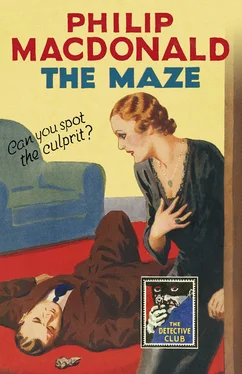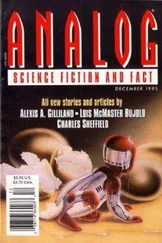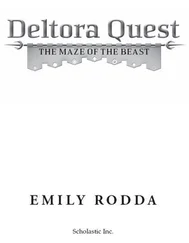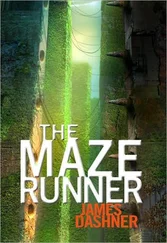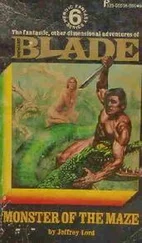In the hall she rushed to Mrs Brunton and caught hold of her and seemed to break down properly. Mrs Brunton and Mrs Bayford tried to soothe her. I gave them permission to take her into the library, which opens just off the hall, so that she could lie down. I then entered the dining-room and began to call in the persons one by one. When I’d questioned Mr Harrison, Mrs Brunton and Mrs Bayford, Mr Adrian Brunton and Mr Hargreaves, I wanted to question Miss Lamort. I went into the library and found her. She was lying on the sofa. She was very pale and didn’t seem to appreciate what was going on.
Detective Inspector Syme then arrived with the divisional surgeon and took charge.
Thank you, Sergeant … Are there any further questions which the jury would wish to put to this witness at this stage? … No? … Very well. Thank you, Sergeant; you may stand down …
Call Inspector Syme.
II
DETECTIVE INSPECTOR JOHN SYME
W HAT is your full name?
John Syme.
Will you please take the oath?
I swear by Almighty God that what I shall say in evidence in this Court shall be the truth, the whole truth and nothing but the truth.
You are a member of the Metropolitan Police Force?
Yes. I am a Detective Inspector of L.I. Division.
Will you please tell the Court, Inspector Syme, the circumstances under which you were called to 44 Rajah Gardens on the morning of Thursday , 12 th July?
I was called on the telephone by Sergeant Crawley at 2.55 a.m. on Thursday last. Sergeant Crawley reported that there was a death at 44 Rajah Gardens, the deceased being Maxwell Brunton, the leaseholder of the house. Sergeant Crawley stated that the circumstances of the death were indicative of murder. I immediately called a car and fetched the Divisional Surgeon, Dr Crosby, and I then proceeded at once with him to 44 Rajah Gardens, reaching there at 3.12 a.m.
You heard Sergeant Crawley’s evidence, Inspector Syme?
Yes.
When you entered the house I assume that you went to the study and inspected the body?
Yes. I found everything as described by Sergeant Crawley and as shown on the plan which you have before you.
Were you able, Inspector, to form any theory as to whether death was caused by the deceased himself, by accident, or by some other person or persons?
I came to the definite conclusion that death could not have been caused either accidentally or by the deceased himself.
Will you please tell the Court, in your own words, Inspector Syme, what you did after your inspection of the study?
I followed the usual routine. I took official charge of the premises, put a constable on duty outside the study, sent for the Police photographers and notified the Divisional Chief Inspector, who asked me to notify Scotland Yard, which I did. I then questioned the inmates of the house. The statements made by them, both to Sergeant Crawley and myself, are with the Police papers which you have before you.
One more question, Inspector. I realise that it is unnecessary for us to get you to inform the Court as to the substance of the statements which you obtained from the members of the household since the gentlemen of the Jury have these statements before them, and, further, will hear the persons themselves giving evidence in due course. But I should like you to tell the Court in what state you found the various inmates when you did question them … We must bear in mind, gentlemen, that when Inspector Syme arrived he had his investigations to make of the scene of death and various other official duties to perform before he entered upon his questioning, and that, therefore, some considerable time would have elapsed between the time of the first questioning by Sergeant Crawley and the second questioning by Inspector Syme … How long would you say that time was, Inspector?
I should say roughly three-quarters of an hour.
Thank you. Now, if you would go on to answer my main question?
I saw the witnesses in the following order: Mrs Brunton, Mr Adrian Brunton, Mrs Bayford, Mr Harrison, Mr Hargreaves, Miss Lamort, Arthur Jennings, the butler, Mrs Jennings, his wife, Jeannette Bocquet, Mrs Brunton’s maid, and Violet Burrage, the kitchenmaid. Mrs Brunton, though much distressed, was quite lucid in her answers. Mr Adrian Brunton was lucid enough but in a nervous state which had reacted unfavourably upon his temper. Mr Harrison was nervous and slightly confused and only made himself clear with some difficulty. Mrs Bayford was suffering from severe shock and could only answer questions. She did not seem able to make any voluntary statement. Mr Hargreaves’s behaviour seemed normal. Miss Lamort was in an extreme state of collapse. I could not ask her as many questions as I should have wished, as, shortly after my arrival, I found that her medical adviser, Dr Fothergill, had been summoned. When he came he advised me that it would not be well to continue with any attempt to question Miss Lamort that night. Accordingly I got her full statement, which you have before you, the next day. In regard to the servants, Arthur Jennings and Mrs Jennings were normal. Burrage seemed half stupefied by shock and Jeanette Bocquet highly excited.
Thank you, Inspector. Now, another point, and a very important one. It is, I know, dealt with in the Police papers which we have, but I think should also be discussed in Court. Was there any indication that No. 44 Rajah Gardens had been entered by any person other than the inmates during the night?
No indication whatsoever.
In your opinion, Inspector, would it have been possible for any other person to have entered the house, make their way to the study and then leave the house?
I am satisfied that such an entry would have been impossible; impossible, that is, without the assistance of some person or persons within the house.
Upon what grounds, Inspector, do you base your certainty upon this point?
The front door was bolted by Jennings as early as 10.15 p.m.—a fact to which various witnesses testify. The windows on the ground floor were also locked and shuttered immediately afterwards—a fact also testified to. The basement windows and door were locked and bolted as usual by Mrs Jennings and Violet Burrage at 9.30 p.m. The construction and position of the house make it entirely improbable—in fact, sir, impossible—for anyone to obtain access to them without the use of ladders. Certainly no entrance could be made through any window without traces being left, and there were no traces. In regard to the study windows, as Sergeant Crawley stated in his evidence, the idea of entrance and exit through them need not be entertained.
Thank you, Inspector … I don’t think we need trouble Inspector Syme any further—at this stage, anyhow …
Call Dr Richard Crosby.
III
JAMES RICHARD CROSBY, M.R.C.S., L.R.C.P., PRIVATE PRACTICE AND DIVISIONAL SURGEON L.I. DIVISION, METROPOLITAN POLICE.
W HAT is your full name?
James Richard Crosby.
Now will you take the oath?
I swear by Almighty God that what I shall say in evidence in this Court shall be the truth, the whole truth and nothing but the truth.
You act, I believe, in the capacity of Divisional Surgeon to L.I. Division of the Metropolitan Police?
Yes.
Will you please describe to the Court, Dr Crosby, your visit to 44 Rajah Gardens in the early morning of Thursday last?
I was called out at 3.5 a.m. I went with Detective Inspector Syme of the Division to Number 44 Rajah Gardens. I was taken to the study and there found and examined the body of the deceased. I found death to have been caused by a blow which had pierced through the cavity of the right eye into the brain. Internal hæmorrhage had immediately set in; death must have taken place within a very short time after the blow was received. I was then shown a large lump of mineral quartz which had projecting from it at one end a long jagged spur. The end of this spur was caked with blood and tissue. I formed the opinion that it was beyond doubt this lump of quartz which had been the weapon causing death.
Читать дальше
